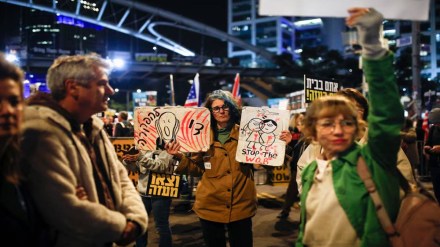Israeli Prime Minister Benjamin Netanyahu confirmed Friday that a deal had been finalized for the return of hostages held in Gaza, offering a significant step toward ending 15 months of intense fighting. However, the announcement came amid last-minute hurdles that delayed the broader ceasefire agreement, which is designed to halt the devastating conflict that began in October 2023.
In his statement, Netanyahu said he would convene Israel’s security Cabinet to discuss the deal and later take it to the full government for approval. The deal, which he described as crucial, would pause hostilities and involve the release of dozens of hostages by Gaza militants in exchange for Palestinian prisoners held by Israel. Additionally, it would allow hundreds of thousands of displaced Palestinians to return to their homes in Gaza, an area severely battered by Israeli airstrikes.
Despite the positive announcement, Netanyahu’s office had previously reported “last-minute snags” that delayed the ceasefire approval, blaming a dispute with Hamas over several key terms of the agreement. These disagreements centered on the deployment of Israeli forces in the Philadelphi corridor, a critical border region. “Hamas has made new demands regarding the deployment of Israeli forces,” said David Mencer, an Israeli government spokesman, highlighting the tensions that arose late in the negotiations. However, senior Hamas official Izzat al-Rishq denied the accusations, asserting that the group remained committed to the ceasefire deal brokered by mediators.
Domestic Tensions and Political Challenges for Netanyahu
While Netanyahu’s announcement was met with cautious optimism by some, it also deepened the internal rifts within his government. Far-right coalition members, particularly National Security Minister Itamar Ben-Gvir, have staunchly opposed the ceasefire, warning that it could jeopardize Israel’s military gains. Ben-Gvir, who has been a vocal critic of any concessions to Hamas, threatened to resign if the ceasefire deal was approved, stating that it was “reckless” and would “destroy all of Israel’s achievements.”
The departure of Ben-Gvir’s party, Jewish Power, would severely impact Netanyahu’s fragile majority in the Knesset, reducing his coalition’s seats from 68 to 62, leaving him with little room for maneuver. Despite Ben-Gvir’s strong stance, Netanyahu’s office has downplayed the threat of an immediate government collapse, but analysts warn that the loss of key coalition partners could destabilize Netanyahu’s leadership.
The Human Toll of the Conflict and the Ceasefire’s Complexities
The ceasefire deal is a critical step in halting the violence, but the broader context of the conflict paints a grim picture. The war began with a brutal cross-border attack by Hamas on October 7, 2023, which resulted in the deaths of 1,200 Israelis and the taking of 250 hostages. In retaliation, Israel launched a large-scale military operation, leading to the deaths of more than 46,000 Palestinians, according to local health officials, with women and children accounting for a significant portion of the casualties.
As the ceasefire deal unfolds, the first phase includes the release of 33 hostages in exchange for hundreds of Palestinian prisoners over a period of six weeks. However, the second phase, which will involve the release of male soldiers and other high-profile captives, is expected to be far more contentious. Netanyahu’s government has been adamant that it will continue military operations to dismantle Hamas, even as it seeks to negotiate a lasting ceasefire with the group.
“The deal is not without challenges,” Netanyahu acknowledged in his statement, underscoring the complexities involved in securing a long-term peace. The Israeli leader faces pressure not only from his government but also from international stakeholders. U.S. President Joe Biden, while supportive of the ceasefire efforts, has been critical of the humanitarian toll the war has taken on Gaza’s civilian population.
Looking Ahead: Questions About Gaza’s Future
While the immediate future may bring a temporary cessation of hostilities, questions about the future governance and reconstruction of Gaza remain. With much of Gaza in ruins, the task of rebuilding will require significant international aid. The broader question of who will govern Gaza, and whether Hamas will maintain control or be replaced by another power, hangs over the ceasefire discussions.
As the situation remains fluid, Netanyahu’s government is grappling with a fragile balance of political pressures. His coalition’s stability will depend on whether the far-right factions like Ben-Gvir’s party remain in support of the ceasefire or whether more defections occur.
In the midst of these political and military dynamics, Netanyahu’s office emphasized that the return of hostages would be a priority for the Israeli government. “I have instructed a special task force to prepare for the reception of the hostages,” Netanyahu announced, ensuring that the families of the captives were informed of the deal’s progress.
Ultimately, the ceasefire deal represents a pivotal moment in the conflict, but it remains to be seen whether it will be the start of a broader peace process or merely a temporary pause in a prolonged and unstable conflict.
